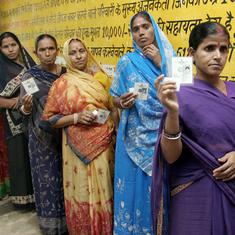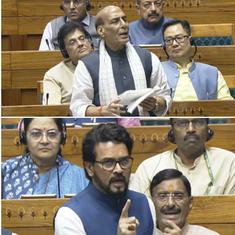I am announcing a package of Rs. 1.25 lakh crore. This package will change the face of Bihar: PM @narendramodi
— PMO India (@PMOIndia) August 18, 2015A release on the Press Information Bureau detailed exactly what this package would look like. More than Rs 77,000 crore going to roads and highways, with the rest being spread around railways, electrification, energy needs and a few other areas. About Rs 40,000 crore from ongoing works and previous special packages also remains unspent, allowing the government to claim a stimulus to the sate of around Rs 1.65 lakh crore.
The government also announced a tax relief on new capital investment as a way of spurring industrial development, efforts that are sure to turn into talking points for the Bharatiya Janata Party as it spends the next couple of months campaigning in the state.
The BJP was expected to easily sweep Bihar, a state where along with allies it took home 31 out of 40 Lok Sabha seats in last year's elections. That was until last year, when the two other large parties in the state, the Janata Dal (United) and the Rashtriya Janata Dal – traditionally arch-rivals – came together, along with the Congress, to take on the might of the BJP under Modi.
The fallout of this, presuming the two parties can successfully work together, has been to turn the Bihar elections into a much closer fight than was expected before. And this has forced the BJP, which has been under the gun ever since it was routed in the Delhi polls, and then failed to control legislative business in parliament despite a majority, to do whatever it takes so that it can win Bihar.
That means a special package of more than Rs 1.25 lakh crore, a massive amount to commit at a time when the Centre is concerned about sticking to a rather tight fiscal target. At least in the press release, the government hasn't said when this money is set to be released, giving it the flexibility to allocate it based on how much leeway it has in its budget annually.
But the number is still immense – especially when put up against the One Rank One Pension demands from military veterans, who want pension compensation to be based on rank at retirement, not date of stepping down. This is the way the arguments are being put forward:

No money for OROP. Rs. 1.65 Lakh Crore of special package for Bihar just before state election. Election politics is supreme.
— Hari Kumar (@HariNYT) August 18, 2015
PM #Modi gives Rs 1.65 lakh cr to #Bihar but won't give Rs 8k cr for #OROP: #Rahul in Amethi http://t.co/MTPMoaKbW0 pic.twitter.com/qaAuiixBJC
— ET Politics (@ETPolitics) August 18, 2015Flawed comparisons
That projection however is flawed, because it isn't an apples to apples comparison and it might not take into account all the other sorts of costs that come attached to these promises.
First, the One Rank One Pension commitment is not set in stone. The government has estimated anything from Rs 7,000 crore to Rs 10,000 crore just for this year's defence budget, but others have suggested that the actual cost, depending on the exact way it gets implemented could be as much as Rs 20,000 crore. That would take the overall cost of military pensions to more than Rs 93,000 crore.
Second, the OROP commitment is not a one-off. It is an annual commitment that would increase in cost every year, and every time the salaries for military staff, based on pay commission recommendations, are adjusted. As economist Ajay Shah has pointed out repeatedly, this could end up being the costliest pension imaginable, because it would be wage-indexed on top of the fact that 80% of military staff retire between the ages of 35-40.
Third, the Bihar commitment is (sort of) set in stone and a one-off, without a time limit. The government didn't grant Bihar its ultimate demand of being given special status, a budgetary category that attracts all sorts of other financial benefits. Instead, it focused on a massive, but one-off special package, without limiting itself in by putting deadlines on the outlays, based on the information put out so far. (Never mind the other pertinent point that Bihar still needs all the help it can get).
Fourth, OROP could open up a rather dangerous can of worms. Railway employees have also begun talking about demanding One Rank One Pension, and while the demands might be valid, this is the reason the government has been holding talks on the exact formula, so that it doesn't turn into an unviable fiscal dilemma.
The package to Bihar too could spark off demands from other states, obviously, but because the BJP isn't laying down an exact principle upon which it is doling out the cash, it remains a question of the Centre's discretion, as it has been all along. Accepting OROP, however, would mean committing to a principle that would be hard to apply for one set of government employees and not another.
It's important to remember, the government has not rejected OROP. It has done the opposite, unequivocally stating that it will implement it, once the specifics have been worked out. So, while the lack of a timeline for the implementation of something that was promised in the BJP manifesto last year is grating – especially in the face of the blatantly political announcement of a special package to Bihar – but the comparison doesn't quite hold.










